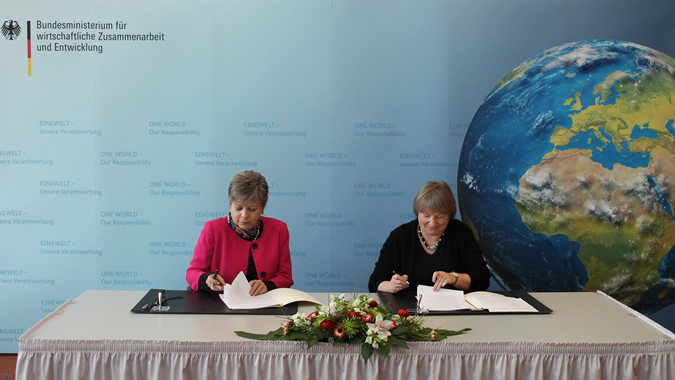Germany and ECLAC Agree to Cooperate in Implementing the 2030 Agenda in the Region
Work area(s)
Alicia Bárcena, Executive Secretary of the United Nations organization, and Christiane Bögemann-Hagedorn, senior official at the Federal Ministry for Economic Cooperation and Development, signed an agreement in Berlin.

The Economic Commission for Latin America and the Caribbean (ECLAC) and the Government of Germany agreed on January 26, in Berlin through a convention signed by both parties that the new joint cooperation programme for the period 2016-2018 will be dedicated to support the implementation of the 2030 Agenda for Sustainable Development in the region.
The agreement was signed by the Executive Secretary of the United Nations regional organization, Alicia Bárcena, and the Deputy Director General for Latin America at the German Federal Ministry for Economic Cooperation and Development (BMZ), Christiane Bögemann-Hagedorn, after negotiations held on Monday, January 25.
That day, delegations from both institutions assessed the cooperation activities carried out up to now, with an analysis of the lessons learnt, and established the general framework for the next programme, which will be entitled “Promoting the Implementation of the 2030 Agenda for Sustainable Development in Latin America and the Caribbean.”
The programme, the specific contents of which will be detailed by ECLAC and BMZ in the coming months, will lay emphasis on the incorporation of the 17 Sustainable Development Goals (SDGs) of the 2030 Agenda –approved last September by the United Nations General Assembly- in national development plans and strategies.
Other priority areas of work were the closure of gender gaps, the strengthening of the institutional framework for universal social protection, structural change with inclusive and sustainable industrial policies, public policies for the adaptation and mitigation of climate change and the decarbonization of energy grids.
On January 25, at the BMZ in Berlin, ECLAC’s Executive Secretary also participated in a presentation on the Latin America Economic Outlook 2016 (LEO) report –prepared jointly by ECLAC, OECD and CAF-Development Bank of Latin America- along with Hans-Joachim Fuchtel, Parliamentary State Secretary at BMZ; Mario Pezzini, Director of the Development Centre at the Organization for Economic Co-operation and Development (OECD); and Christian von Haldenwang, from the German Development Institute (DIE), with Christiane Bögemann-Hagedorn as moderator.
Additionally, Alicia Bárcena held a meeting with ambassadors from the Group of Latin American and Caribbean Countries (GRULAC) accredited in Germany, where the Executive Secretary outlined the region’s current and structural challenges. She also had an interview with Maria Böhmer, Germany Deputy Foreign Minister, and with Didier Lamlé, the Ministry’s Director for Latin America and the Caribbean.
During her trip to the European country, ECLAC’s Executive Secretary was accompanied by the Deputy Executive Secretary for Administration and Programme Analysis, Raúl García-Buchaca, and the Director of the Division of Production, Productivity and Management, Mario Cimoli.
The first cooperation activity between ECLAC and Germany began in 1979, and since then both parties have worked together in various projects related to the economic and environmental development of Latin American and Caribbean countries.
In 2003, ECLAC and BMZ agreed to change the focus of specific projects to long-term and multi-thematic programmes and defined their cooperation as a “strategic alliance” based on shared values and in search of mutual benefits. The relationship consolidated even more in 2005 when Germany officially entered ECLAC as a Member State.
This cooperation has enabled, among other achievements, to access knowledge and institutional and technical experiences available in Germany and the whole Europe, to increase the response capacity to requests of technical assistance from countries, to position relevant and innovative development agenda matters and to generate complementarities with other bilateral cooperation projects promoted by Germany, as detailed in the publication CEPAL-BMZ: A Cooperation Model for the XXI Century, published in 2011.
Subregional headquarter(s) and office(s)
Contact
Public Information Unit
- prensa@cepal.org
- (56 2) 2210 2040